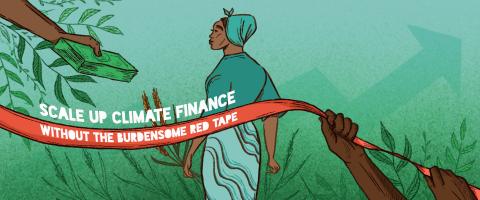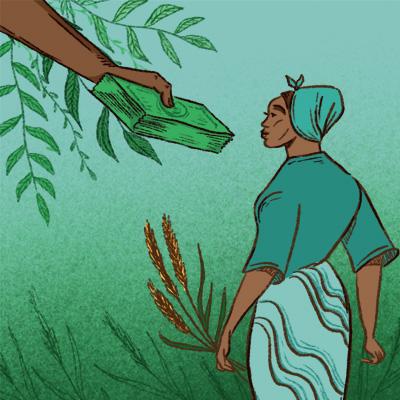Climate finance: The elusive accessibility and the need for transformative change
Climate finance: The elusive accessibility and the need for transformative change
The Africa Regional Resilience Hub, led by SouthSouthNorth (SSN), is a crucial component of the COP28 Resilience Hub. Along with several other regions, the Regional Hubs work to amplify regional voices to global decision-making spaces, with a particular focus on communities and underrepresented and lesser heard voices. This feature forms part of the Africa Regional Hubs efforts in this regard. The COP28 Resilience Hub events are all hybrid and allow for virtual attendance and participation. Register here for the Resilience Hub virtual platform.
This post first appeared on the SouthSouthNorth website.

In the realm of climate finance, the promise of opportunities often falls prey to the entangled web of jargon, eligibility requirements, and accreditation processes. Accessibility to climate funding remains elusive, hindering efforts to address the pressing challenges of climate change. This piece explores the need to amplify the voices of marginalised groups, streamline processes, and promote transformative change in climate finance. “It is estimated that less than 10 percent of money committed under international climate funds to help developing countries take action on climate change is directed at the local level,” according to a press release published by the International Institute for Environment and Development (IIED) on the 7th of March 2017.
This still holds true, as it argued that over a decade ago, developed countries that produce the most emissions made commitments to avail climate finance meant for climate action to the tune of $100 billion per year by 2020, but this commitment has not been met with 90% of the funding being directed to mitigation as opposed to adaptation which less developed countries primarily access. (UNDP 2023 Cassie Flynn). Supporting climate action in the least developed countries | Climate Promise (undp.org) Blog post: November 17, 2023. It is important to ensure that voices of marginalised groups are heard and that they have equal access to climate finance. Women, young people, persons with disabilities, and other vulnerable communities must be included in the decision-making processes and be able to access and benefit from climate funds. Their perspectives and experiences bring invaluable insights and should shape the allocation and utilisation of resources.
The journey of climate finance is laden with intermediaries, leading to a significant portion of funds being consumed by high-level meetings and expert payments before reaching local communities. To foster transformative change, mechanisms must be implemented to reduce the layers of processes and build mutual capacity between experts and communities. By streamlining climate finance, more resources can be directed towards impactful projects and initiatives, benefitting those most affected by daily with the effects of the climate crisis, ranging from floods to fires to food insecurity to evictions and more.
It must be recognised that despite the fears of putting funds directly in the hands of local communities due to “risk”, big corporations, development agencies, and even experts are not immune to missteps in climate finance. Investment in climate action carries risks, but it should be guided by meeting people’s needs and supporting communities that face challenges created by the external forces of emissions. It means taking responsibility and investing in initiatives that build resilience, facilitate adaptation, and aid recovery from extreme climate events. This is not only a moral imperative but also a worthwhile investment in a sustainable future.

For climate finance to be effective, it must be flexible and responsive to the diverse needs of communities. The Slum Dwellers International (SDI) Next Level Grant Facility through the Voices for Just Climate Action (VCA) programme in Kenya serves as an example. It provides support to organisations, businesses, and individuals to undertake and scale up climate action without burdensome red tape often associated with grant facilities. This approach enables tailored solutions and empowers local actors to drive impactful change; therefore, the work is not divorced from issues of monitoring and transparency; in fact, it builds on co-creation.

The quest for accessible climate finance is ongoing, and the need for transformative change is clear. By amplifying marginalised voices of those most affected by climate change, streamlining processes and fostering flexibility, local action climate finance can enable climate resilience, adaptation, and recovery. It is imperative that all stakeholders collaborate to ensure that climate funds are allocated equitably and used effectively, empowering communities to address the challenges posed by climate change. As proponents of locally-led adaptation, the principles offer LLA a solid foundation where climate financing can build from.
Download the World Resources Institute (WRI) working paper on Locally Led Adaptation: From Principles to Practice here.
